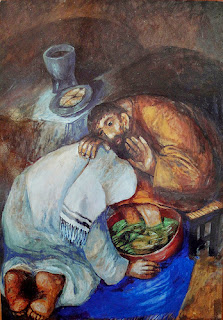Today is Maundy Thursday a day in which Christians remember Jesus sharing the Last Supper with his friends on the night before he died on the cross on Good Friday. The word “Maundy” is derived from the first words of a traditional Latin anthem “Mandatum novum do vobis” or in English “A new commandment I give to you”. These words come from John’s Gospel where Jesus is recorded as saying at the Last Supper:
‘A new command I give you: love one another. As I have loved you, so you must love one another. By this everyone will know that you are my disciples, if you love one another.’
John 13: 34 – 35
John records Jesus saying these words after Jesus has knelt at the feet of the disciples and washed their feet. This is an act they clearly are embarrassed about. A servant would kneel before someone and wash their feet. But now the disciples find their Rabbi, their Master, carrying out this menial task.
When he had finished washing their feet, he put on his clothes and returned to his place. ‘Do you understand what I have done for you?’ he asked them. ‘You call me “Teacher” and “Lord”, and rightly so, for that is what I am. Now that I, your Lord and Teacher, have washed your feet, you also should wash one another’s feet. I have set you an example that you should do as I have done for you. Very truly I tell you, no servant is greater than his master, nor is a messenger greater than the one who sent him.
John 13: 12 – 16
The command by Jesus that his followers should love one another and the requirement that his followers should have a heart for servant ministry, are very challenging. And if we are being honest most Christians would acknowledge that we fall short of obeying the command all the time and certainly fall short of having a heart for being a servant.
Over the last week or so David Cameron has talked on a couple of occasions about his Christian faith. Alistair Campbell, the arch spin doctor for Tony Blair’s government once said that “We don’t do God” when the press asked if they could talk to Tony Blair about his faith. For the first 3 years or so of his time as Prime Minister David Cameron also chose not to do God either. However, this seems to have changed.
I feel it is refreshing that such a public figure is wiling to talk about their faith in public. And clearly from the various reports in the press David Cameron drew comfort from the church before and after the death of his young son.
In an article in the Church Times of 17th April David Cameron explores what he means by being a Christian and how he feels this country is a Christian country.
http://www.churchtimes.co.uk/articles/2014/17-april/comment/opinion/my-faith-in-the-church-of-england
I have to say that my reading of the article is more about why David Cameron is a member of the Church of England than why he is a Christian. And the two don’t necessarily go together. Just as being a Methodist doesn’t mean you are necessarily a Christian.
In the Church Times article David Cameron says that the key Christian values are:
“responsibility, hard work, charity, compassion, humility, and love”
I find this definition interesting. I certainly recognise the last four as being marks of being a follower of Jesus. And I suppose “responsibility” is part of this. After all if we are to conider who our neighbours are. Again as Jesus commanded, then we need to have responsibility to them. But the “hard work” has more to do with church doctrine (“the Protestant work ethic”) than Christ’s teachings.
That said, a Tory of an earlier age, who was also a member of the Church of England did once say that as Christians we should:
“Earn all you can, give all you can, save all you can” John Wesley.
I suspect Mr. Cameron (like Margaret Thatcher before him) would relate to that. But the quote is taken from John Wesley’s sermon “The right use of money”. And in the sermon Wesley clearly makes the point that money must be earned legitimately and not exploitatively. And that money should be used for the good of all. It’s not as simple as earning wedge of cash and doing what you like with it.
“Do you not know that God entrusted you with that money (all above what buys necessities for your families) to feed the hungry, to clothe the naked, to help the stranger, the widow, the fatherless; and, indeed, as far as it will go, to relieve the wants of all mankind? How can you, how dare you, defraud the Lord, by applying it to any other purpose?”
― John Wesley
That self same Church of England priest also once said:
“Do all the good you can. By all the means you can. In all the ways you can. In all the places you can. At all the times you can. To all the people you can. As long as ever you can.”
I am genuinely pleased that Mr. Cameron wishes to talk about his faith. And I am pleased that he is talking about faith during Holy Week.
But please Mr. Cameron, can I urge you to get a complete copy of the Bible. I’ll happily send you one if you like. The Authorised Tory version seems to miss out crucial parts relating to the rich and the poor.

No comments:
Post a Comment